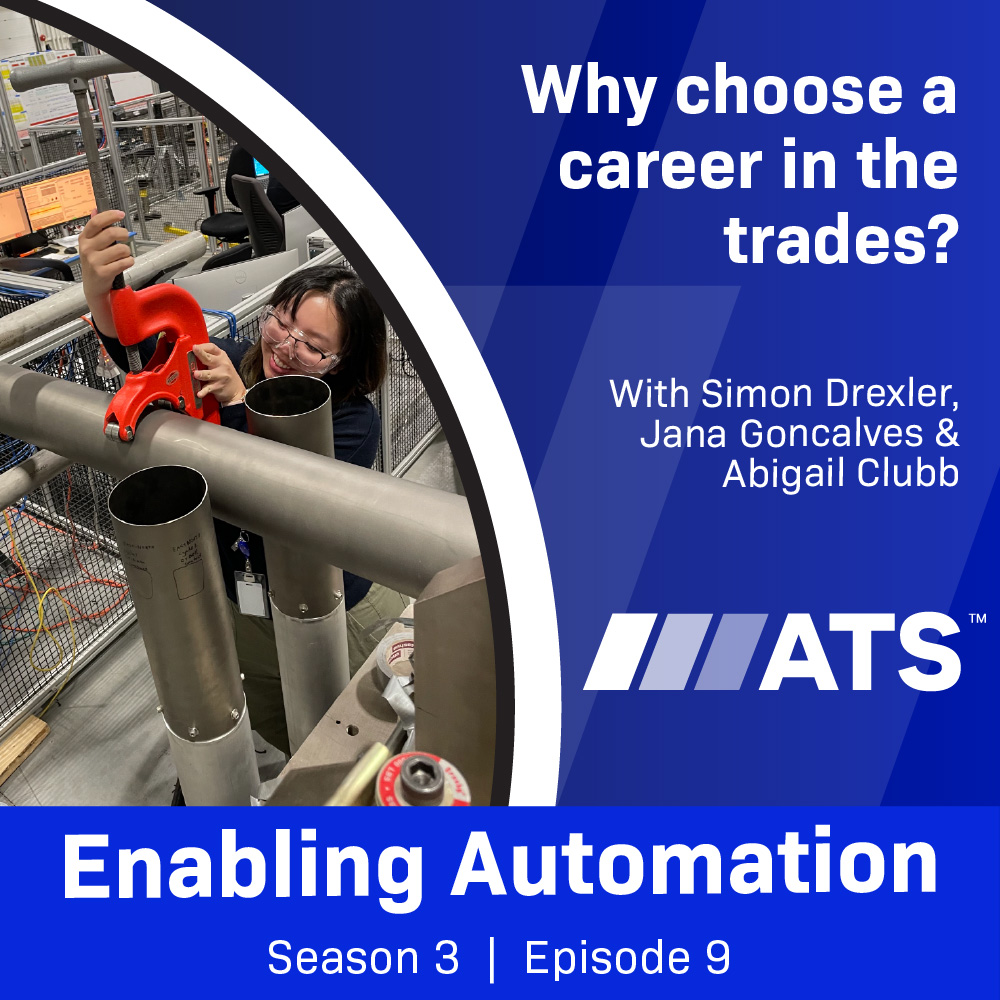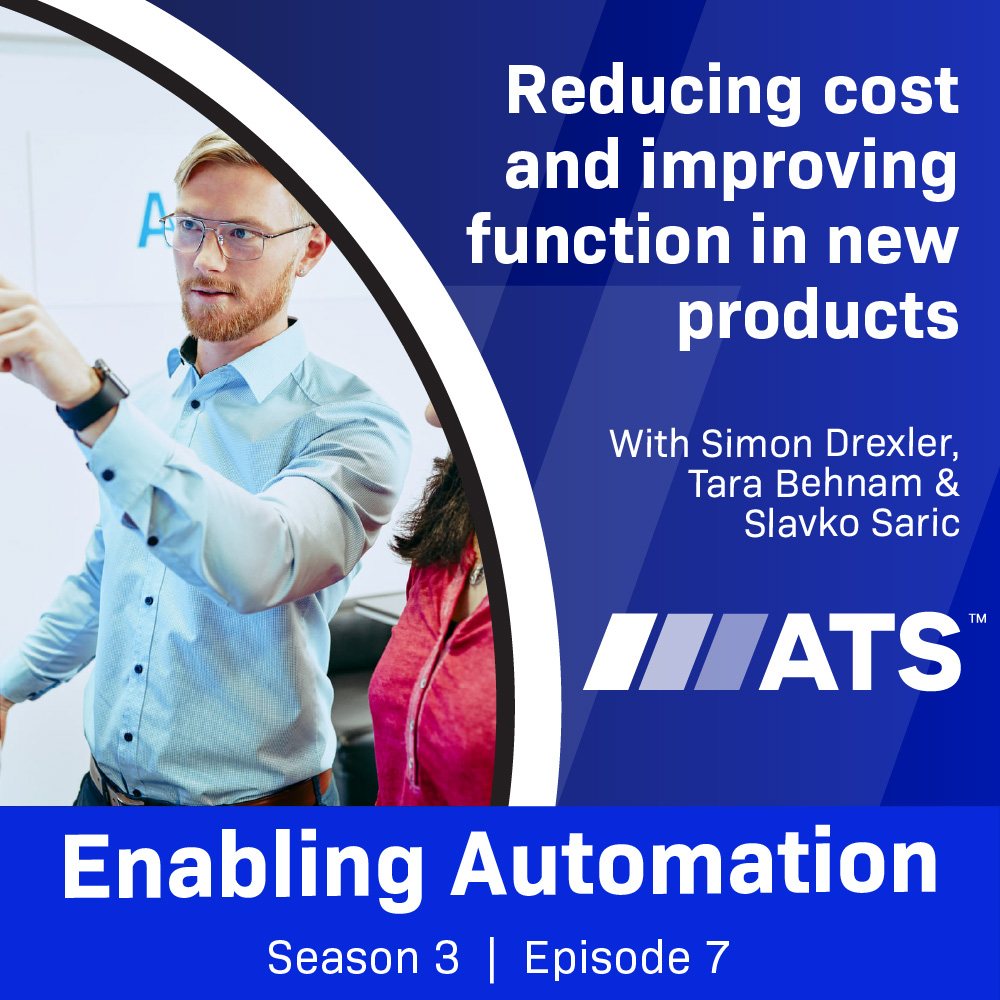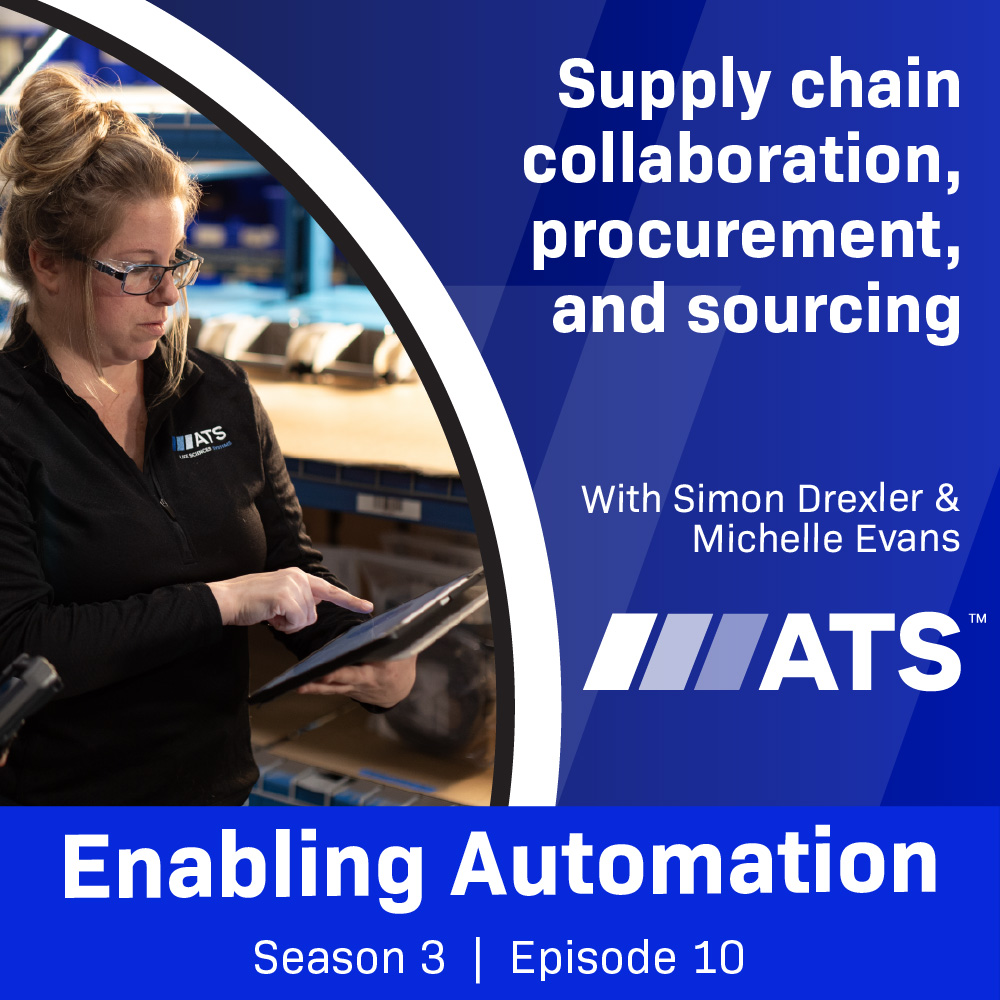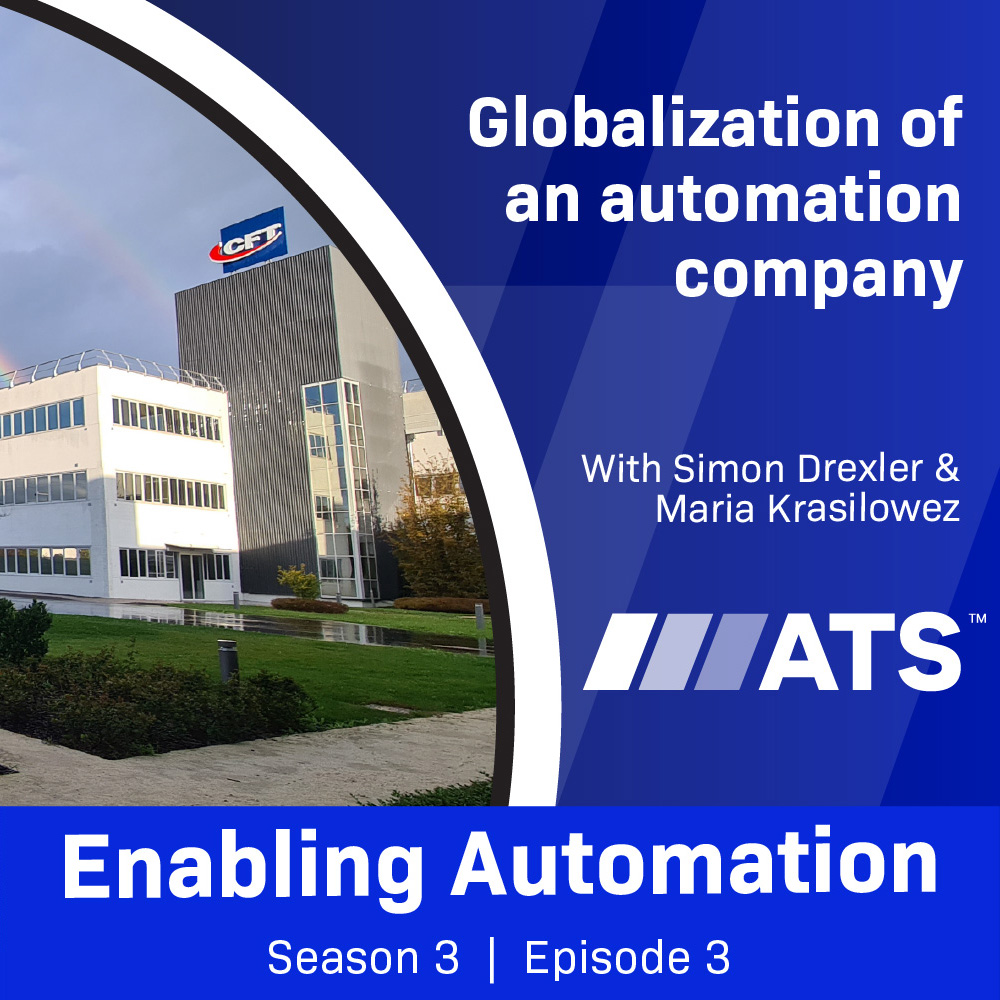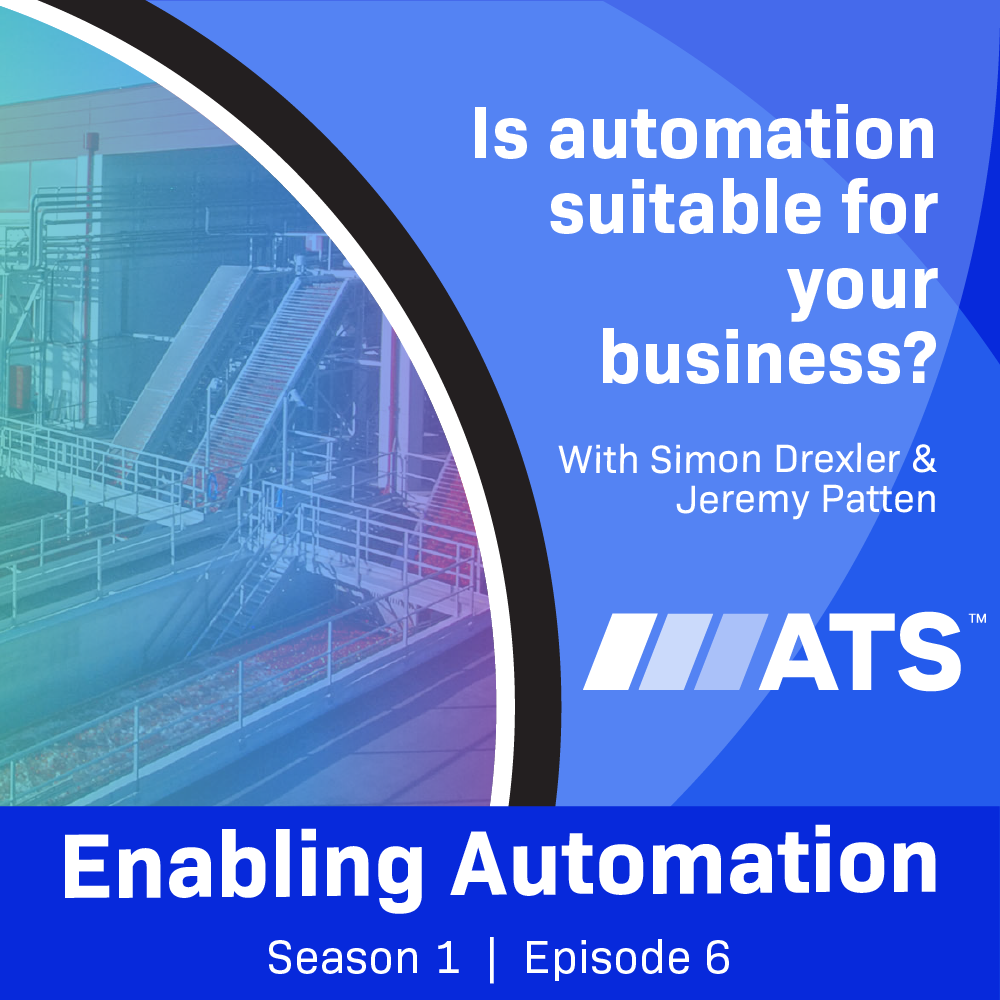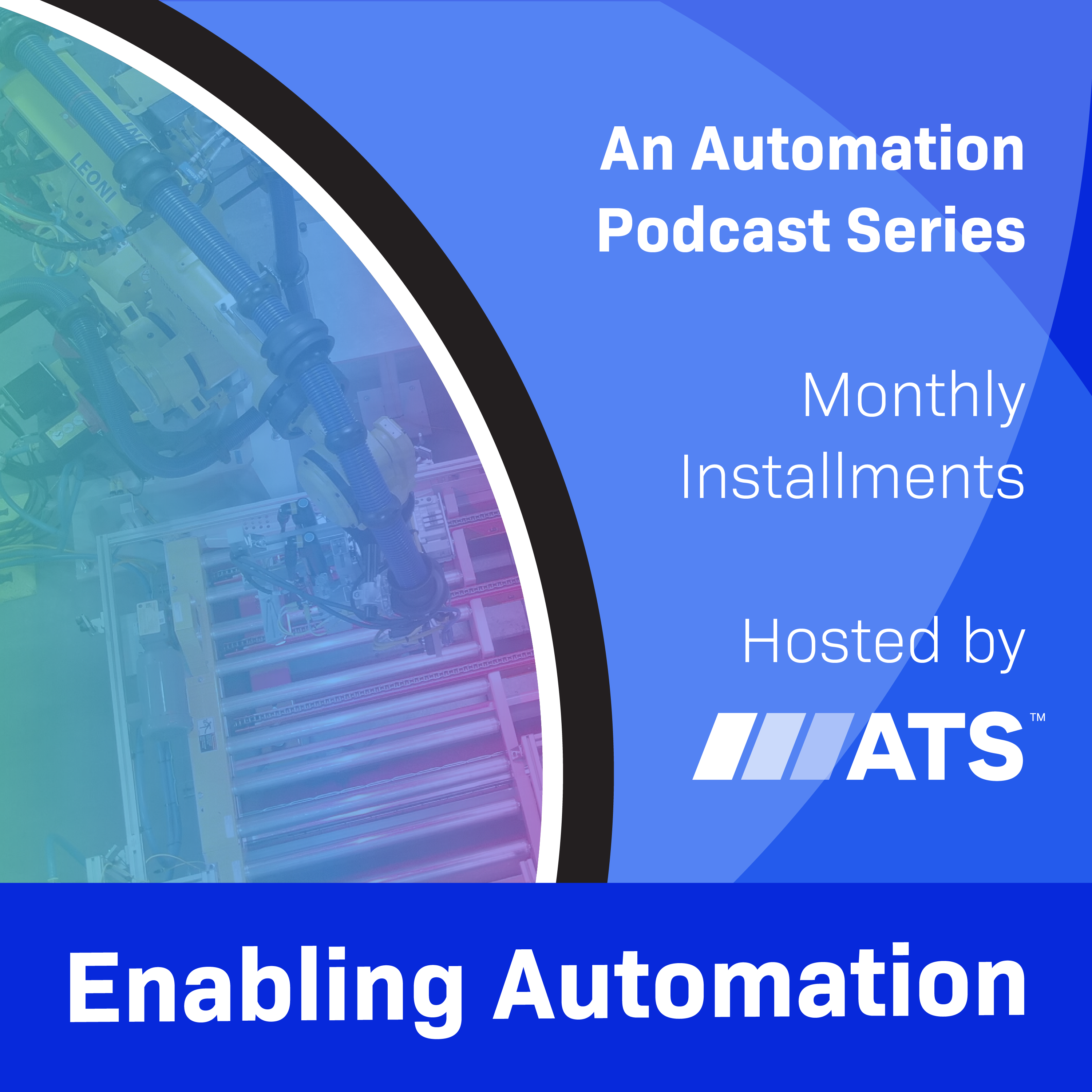Episode Transcript
SD: Welcome to the Enabling Automation Podcast, where we bring experts from across the ATS Corporation to discuss topics that are relevant to those that are using or looking to use automation to scale their operations. I’m your host, Simon Drexler. I’ve been a part of the automation industry for more than 17 years, in various roles at both large and small companies. I’m passionate about applying technology to issues that gate companies from scaling, and where automation is often a solution for scaling operations, or scaling up manufacturing to help the business grow as a whole. Today’s topic is a little bit different than our normal topic, where we want to dive into why you would choose a career in the trades and trades are so critical to what we do in the automation world. Today’s discussion will give Jana and Abby an opportunity to provide context around the trades and the role that they play inside the life cycle of automation. Discussing more of the details about the work that they doand how you recruit strong trades into the business just because it is so critical to what we do. Abby, would you like to go first and just give a quick introduction to yourself before we get started?
AC: Sure. My name is Abby. I’ve been with ATS for about nine months. I’m going into level two Millwright apprenticeship.
SD: And we’re really happy to have you today, Abby, because you’re just starting in to your journey in the automation field. Just starting into the trades. And it should offer fresh perspective to how you’re applying and what you’re working on. And Jana, can you introduce yourself as well?
JG: Hi! So my name is Jana, I am a technical recruiter here at ATS Industrial Automation and I’ve been with the company for about a year and a half now.
SD: And Abby, why don’t we start with you? Coming into, a large automation company, why did you choose to get into the trades and work in automation?
AC: Yeah. So I was exposed to the trade basically, when I started high school, my high school had a great trade opportunities, and my sister before me was into it. And so I decided to try it, give it a shot. I was more headed towards healthcare when I before I was exposed to it, but I chose it because I’m more of a hands on person. I love to think with my hands as they say and think things through while it’s in the moment, put the pressure on a little bit. But that’s how I started. It was definitely high school.
SD: Right. And now that you’re here, you’re applying your trade to automation. Have you found a favorite spot yet?
AC: No, I’m still looking, but I love what I do though. Excellent. Jana, on the other side of this conversation, you’re helping a large corporation go out and find the expertise needed to help scale finding trades. What are you looking for when you’re out looking for experts to join our company?
JC: I think it’s really important to really put yourself out there and show how you are different. I think that really matters because a lot of the time, like I see different roles, they have different particular skill sets that we look for. But you can elevate yourself as a candidate by catching our attention when you showed up to different job fairs. Talk to these companies directly, get to know the businesses and really understand what kind of trades that they offer at those businesses. Different industries might focus on residential, commercial, industrial in our case, but we have different job descriptions where you can kind of highlight, what skills and abilities that maybe are shaped based off of, like what you’ve seen online through those companies. If, let’s say you’re part of a group, for example, like a woman empowerment group for skilled trades, put that on your resume that sparks conversation for interviews. If you were a coach for a sports team, I know it’s not relevant to skilled trades. Also put that on because then it shows that you have leadership and skills in regards to working with teams. So I think there’s a lot of things that I look for that some people kind of think are not as important, but add it on. Share your hobbies. If you’re working on home renovations, mention that even in the interview, because then you’re showing your passion outside of what’s just in work.
SD: Abby, especially here in the Canadian region that we live in Kitchener-Waterloo, we’ve got an automation cluster, and automation is often talked about as a growth industry and in high demand. Did that play any role in the decision that you made?
AC: Yeah, 100%. So I wasn’t born and raised in Kitchener. I was about an hour away in London. So it wasn’t really talked about too much. But after I heard how much there was a need for it, it definitely sparked my interest a bit because when there is a need for people, they are more willing to help teach and expose you to learning. And then maybe Fast-Track your career, which happened to me. So my college career, when I came right out of high school, they changed it around. So instead of a two year program, it became a one year program. So I’m a lot younger than most of my other apprentices that I work with. So that’s really nice to get a head start on that stuff. And it definitely need to be a topic more in high school. Not saying that they didn’t do a good job, but my counselors didn’t know too much about what I was trying to get into. And we struggled a little bit and went back and forth. But it’s definitely a learning experience. But now I feel like there’s a lot stronger support for getting into the trades. I’ve seen a lot more exposure.
SD: It makes me really happy to hear you say that, that that’s been part of your background and part of what got you into the trades, because it’s been a conscious effort in at least the province and at the national level. I sit on the board of directors for Canadian manufacturers and exporters. So sort of share a little more about myself. But that’s been a conscious effort to get that grassroots understanding at the high school level, because you touched on it. Oftentimes guidance counselors and teachers, they just don’t know, they’ve never been in the manufacturing facility. They don’t know automation. They don’t know to be able to direct.
AC: Yeah. And I was so lucky to have a teacher that was so passionate about automation in manufacturing. He really encouraged me a lot into going into it, even though I was incredibly nervous to start it.
SD: And, Jana, I saw you nodding your head as we were having that conversation that. Have you seen that as well, where like the knowledge isn’t out there for what trades do, especially in the manufacturing industry?
JG: I think it’s really interesting because Ontario is really investing into skill trades for future skilled trades careers. You’re seeing a lot of focus from the Ministry of Education to push and encourage students to go to discovery events, to take courses, even they have mandatory learning now for skilled trades and get early exposure to like experimental learning. I know that they offer like pre trades programs as well. Where, you know, I have students who, you know, you don’t have the experience prior to going into trades, but you want to explore it. I think where people get stuck is they go on these websites and colleges and then there’s so many different trades, and then you don’t know which one you want to select. I’m sure, Abby, you’ve had like similar situation when you first started, right?
AC: Yeah. I had no idea what a millwright was when I started. Like people would ask me, what do you do? And I’m like, I have no idea. I just thought it was really cool. And, but I know a lot more about what I’m supposed to do now, not just from, you know, obviously being in it, but from going to events like that and asking people, what do you really do on your day to day, like millwrighting it definitely a lot more. They their nickname is Jack of all trades. We do a lot across the field. We learn so much over the pneumatic, hydraulic, integration, tear down, mechanical assembly, you know, just so much. You could really go in any direction. Like one day you could be on hydraulic, one day you could be doing something completely different. It’s just really cool. And I wish that knowledge was more out there and talked about.
JG: Yeah. Like I find like online when a lot of students like I get feedback from them. You don’t need a lot of experience prior to getting into trades, but then when they go on the website and try to look for stuff, they haven’t had exposure to trades before. So not knowing where to start, I think where people really get anxious about is they don’t want to commit to a 2 to 5 year apprenticeship and that’s where they have like pre apprenticeship opportunities, where you can get your feet wet and try different trades because maybe you’re still not unsure if you want to do maybe construction or you want to maybe be an electrician, but you’re not 100% sure. And then you try the pre apprenticeship and then you have an easy transition because your goal is to eventually get into apprenticeship, do your exams and then get your red seal. And that takes commitment. And I like the fact that the schools are offering pre trade programs where you can try a course and it gives you a variety of different skill trades. So it could be construction, electrical, and then machining, all in that one course. And then you can learn about blueprints, mathematics. By the end of that course you get a better understanding of what you want to do without, having to fully commit. And then pre apprentice, you get mentorship, you get opportunities, and you can start early because they have Ontario youth programs early as grade 11 and 12. So you can even start before. And you get that exposure way earlier. And I hope that the teachers and guidance counselors are providing opportunities like I’ve had teachers come to me a job fairs and say, hey, can we do a tour at your facility? Because if, you know, teachers might go ahead and do it. But if you’re a student, ask your teachers, can we start touring the companies that we’re interested in? I want to see what a shop floor really looks like. So that’s something like I encourage a lot of the students if you’re curious.
AC: Yeah. And like speaking, one of your episodes that you did, I think it was Women in Engineering. One of them said, you really have to see it to be it. And I really, really do. After she said that, I really thought about it and I was like, it really is that I wouldn’t have chose this career, but because I knew nothing about it until I was exposed to it.
SD: That is one of those lines that has stuck with me since that discussion as well. The if you can see it, you can be it, and it applies to lots of different areas of the world. And with children and kids and those types of things. So it resonates really strongly with me as well. I think it’s so exciting to hear about all the programs that exist around here, the, the pre-trade programs. And I think you’re right, you’re starting to give more exposure at lower risk. And that’s good context for our listeners to understand where there are these programs that are trying to build up more trades, that are trying to have the skilled workforce in place for more automation across the environments, that we work within. Abby as one of the parts of your answer is you very well succinctly described why millwrights are so important in the automation world, because you can move from pneumatics to hydraulics to mechanics and everything in between on any given day. And that’s really how you bring a system together. It it’s really not even that one thing. Right.
AC: Yeah. You have so many components to one assembly. Honestly every day for me is completely different when it during our busy days. So it just so cool not working on the same document or not working on the same production where you’re just doing the same thing day in, day out. You’re just learning constantly.
SD: That’s excellent. Another thing that you said is, I kind of wish I would have known that is there. Is there anything that you wished somebody would have told you before you went down the path into the skilled trades?
AC: I wish someone told me not to be afraid of it. There’s really nothing ever to be scared of it. Like I don’t mean to out myself here. I’m a 4’11” girl. I was really, really scared of it because I’m really tiny and, I didn’t know if I would be able to, achieve the same things that people already in the trades could do. Sometimes I’m exposed to things that aren’t really made for someone as small as me, but I think that kind of pushes me to accomplish something. Can I really do this? And the answer is “Yeah”, doesn’t matter what size you are, or shape or where you come from, it doesn’t change how well you work. That’s what they’re looking for. They look for. Are you a good worker? Do you want to listen? Do you want to learn? And that’s what I love about it.
SD: It’s such a great answer and I can see how much you’re enjoying your time working on automation and being able to see, you know, something different every day.
JG: That’s great Abby I think trades are very important. So for ATS it’s absolutely fundamental for our business to have trades people. ATS strives for innovation and creating new technology. And a huge part of this is because trades allows our vision to be built, and you get the opportunity to really see your projects come to life and get integrated all around the world, which is very exciting. We couldn’t have done this without tradespeople. So in general, there is a very high demand in skilled trades workers. Trades make a huge impact in our lives. Whether it’s maintenance services or building our home so we can have somewhere to live, or manufacturing operations where we build machines that help produce products that we use on a daily basis. The list could go on. Overall, I think trades is essential work and trades is needed everywhere. It really keeps our economy flowing.
SD: Abby, do you have any tips around on finding a mentor and finding those that have helped you along your journey so far? You want someone that is going to push you at the end of the day and, get you to do your best. If you have someone that just says go do that and doesn’t help you at all. And I’m not saying they’re going to hold your hand. Absolutely not. But they want you to do better and create skills that you’ve never learned before and that you can use over and over again.
SD: The goal of the today’s discussion is to provide context to how the trades work. And I’ve learned a lot. So, Jana, can you talk through the process that candidates go through to become apprentices in the automation world?
JG: I don’t think there’s ever really a right answer to this because everyone’s journey is very different. Getting into skilled trades. So the way I look at it is you will start by seeing what you’re interested in. And I think once you start narrowing this down, and you know what, you can change your mind later on. I’ve seen people get dual licenses later on, but your goal is to see what you’re passionate on in trades. And then, you know, maybe you take pre trades programs or you do a pre apprentice program to start off, but some apprentices have not, didn’t even try looking at that alternative. But you can start in grade 11 and 12 and get your experience early in and get exposure early on and experiment and learning. That’s one route. Or let’s say later on you want to do a career change and you met somebody like a different company and they want to sponsor you, then you can take that opportunity, take on an apprenticeship. If the company’s willing to invest into you and you’re willing to learn, you can get into that. The nice thing about doing an apprenticeship is you get to learn skilled trades on the job, you get mentorship, and you get paid for it. I think that’s a that’s a great combination. And then in that apprenticeship, it takes about 2 to 5 years to complete at some point. Then you decide, do I want to get my license? And then you do an exam and then you can become a red sealed journey person.
AC: I have something to add. Yeah, I did a very unconventional way of joining the trades. So that’s how I got into it. I just started at this company. I already knew I already got accepted into college right out of high school. So that’s what I did for the summer is I worked somewhere. I just fell in love with it so much. I was so confident into going my college route just to fast track my career opportunities a little bit, and that’s how I got into it, was just exposure from people that I knew and who they knew and it really helped.
JG: And that’s the thing, Abby, like that’s why networking is so important nowadays. Like if you and that’s what I was trying to get out earlier with the look like when looking at a, recruiting for an applicant, it’s put yourself out there. If you know that company’s there go to those job fairs, go to workshops at universities, colleges offer workshops all the time. Yes. And even if you’re, you know, maybe you’re interested in operations and working an office job, go to the trades thing, try it out, see if you like it. Because I’ve had people where they go to a workshop and their teacher force them to go and they’re like, I don’t want to be here. I don’t want to try it. I don’t know, I don’t know anything about trades. Why am I here? And then they end up doing one of the workshops and it changes their whole perspective. They’re like, I just welded a pipe together. I didn’t even know I could do that. I just looked at an electrical panel. I don’t know, there’s different workshops that they have there, and I didn’t even know I was capable of that. And they come to me at the booth and start talking to me about their experience and showing me the items, and they’re so proud about what they could do. And then you build those connections with different recruiters at these events. And I think a lot of people they use Indeed a lot. And I’m not saying anything’s wrong with Indeed, but then they forget about other resources. I think some people in trade just assume that, like LinkedIn is just for people in the office. I think that people are very limited when they only look at indeed, I think start building your LinkedIn profile. I use LinkedIn as a recruiter, and I’ve recruited people from, millwrights to electricians on LinkedIn and build that profile, show that you have your image on your profile picture of you actually welding something, let’s say, and as an example, or if you’re a carpenter or just show personality of yourself and also follow like minded people on there, there’s different groups that you might not even know about that you can join and join those clubs on there and go to those different events.
AC: Honestly, get into that leadership role where you’ve shown recruiters like Jana that you can be a leader and that you are not afraid to get done what needs to be done, even when it’s hard.
SD: Let’s switch perspectives a little. Our listener base is largely made up of enterprises that are looking to scale and looking to find apprentices. Do either of you have some advice for those that are looking to build an apprentice program and create a good environment for education and building skilled trades within their organization?
AC: Understanding what you need to have to support your apprentices, understanding that you need to, that they need that sponsorship to get through their career. The mentors you need to be ready to have someone to pair them with or a team to put with. That’s what I would say.
JG: I think if I put it in my perspective, if I was a new person starting a new job, I would want a plan set for me. Like when I’m going in first week, is knowing that I do have a mentor, knowing that, I’m giving the opportunity to learn and to have a comfortable place to ask questions because you, you, there’s not like you shouldn’t have to be expected to know every single thing. But as somebody who is an apprentice, also, we want them to ask questions and provide that environment where they can ask questions and not assume that, you know, they know every single thing going into it, because that’s the point of the apprenticeship, right? Creating like a weekly plan and providing the right skill set and to set you up for success. I think that’s the most important thing.
SD: Abby, thanks very much for joining us today and sharing your background. Would you have any closing thoughts for anybody who’s thinking about getting into the world of skilled trades and applying that to the automation industry?
AC: It sounds a little cheesy, but honestly, I would just say just do it. It takes a lot of thought to start something new, especially if you don’t necessarily know what you’re getting into. Like Jana said multiple times, you can change your mind. As nervous as I was, I’m so glad that I decided to just go for it. If you can live every day just learning and respecting and communicating, and if you can do that, you can join the trades, no problem.
SD: Thank you. And then Jana, same to you. Would you have any closing words of advice for somebody who’s looking to try to get into this industry?
JG: I think just be curious. I think that’s a beautiful thing because you might surprise yourself. I think in the end and if you don’t try it, you know, then you never know that you can actually do it.
SD: Thank you both so much for joining me today on the podcast and giving your time and expertise to our listener base. I really appreciate the conversation and stepping outside of the normal topic or our podcast here. So thank you so much.
AC: Thank you. It’s been really fun.
JG: Thank you.
SD: And to those that are listening, as always, thank you so much for joining us today. This is the ninth episode of our third season, and we’ll be back next month with our 10th and final episode of the season, which is supply chain collaboration, procurement and sourcing. And we’ll be talking to Michelle Evans. Thank you so much again for joining us today. And until next time.
